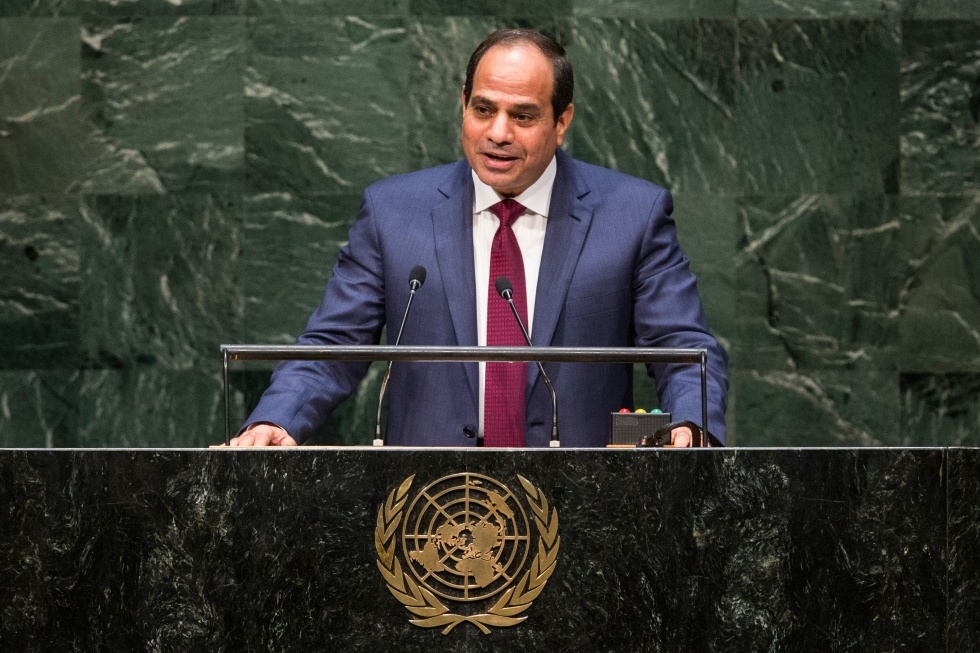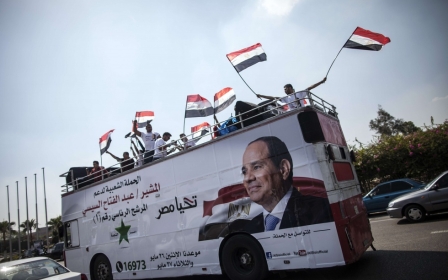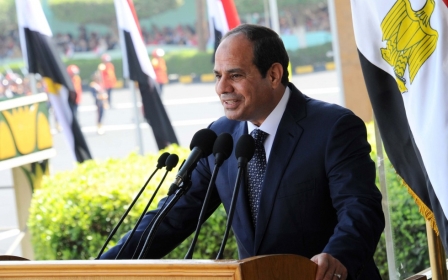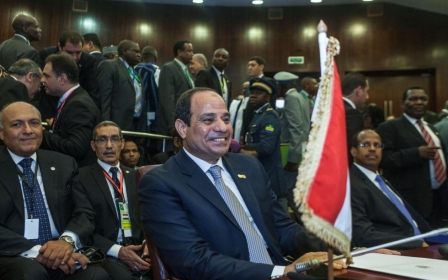Sisi’s Economy: Big plans fail to yield results
'Prices for bread and vegetables all increased. My family is poor and I don’t know how we are going to feed our kids'

President Sisi speaks at the 69th UN General Assembly at UN Headquarters 24 Sept (Andrew Burton/AFP)
Published date: 13 February 2015 01:15 GMT
|
Last update: 9 years 9 months ago
During his successful presidential campaign, Abdel Fattah al-Sisi never announced or published a political or economic programme. Instead, his approach was to provide vague promises to put an end to the political unrest, instability and economic stagnation that has hit the country since Mubarak’s downfall.
The campaign tactic was successful, and after his first 100 days in office, Sisi earned some praise from Capital Economics, Bloomberg and The Economist for positive economic trends, although doubts persist on the mid-term stability and the status of political freedom in the country.
Economists and investors praised Sisi’s early decision to partially cut subsidies on gas and fuel as a first step to reform the highly inefficient subsidy system on oil products responsible for a large share of the country’s deficit. In the past, negotiations with the International Monetary Fund (IMF) for a multi-million dollar loan always failed, because Egypt’s leaders had shied away from cutting subsidies in fear of the political costs and social unrest they would have had to face.
But Sisi’s government announced, and subsequently enacted the cut, leading to a sharp rise in prices for fuel and natural gas - between 64 and 175 percent - and costs for public transportation, food and other goods. As a result of the subsidy slashing, the government plans to save around $7 bn of deficit in the 2014 - 2015 budget, but in return, the price of some commodities has increased by as much as 200 percent.
“Prices for bread and vegetables, all increased. My family is poor and I don’t know how we are going to feed our kids,” said Nada, a 50 year-old house cleaner from Faysal, a working class neighbourhood in Giza.
“Poor people are surely the most affected by the cut on subsidies and the subsequent rise in prices,” Mohamed Nosseir, an Egyptian liberal politician and entrepreneur, said. Although reform of the energy sector and the subsidies programme is necessary, Nosseir believes Egypt should finally “address its core issues: government inefficiency, lack of opportunities for small and medium businessmen, inability to address the youth unemployment rate and unwillingness to fight corruption.”
President Sisi has blamed the sharp and sudden rise in commodity prices on the many businessmen who overprice their products and has proposed to temporarily allow military outlets to sell the same products at a lower profit rate. In this way, the president will expand the already large economic role of the army at the expense of the private sector. So far, Sisi has already sent conscripts to drive public buses to counter a strike of public transport workers. Military construction companies, have also been sub-contracted to speed up the reconstruction of churches, infrastructure projects and public buildings.
According to a World Bank report published in September, “the dominance of a few large, old, and politically connected firms is strangling the growth of a robust and competitive private sector.” The consequence, the report says, is a lack of employment opportunities, with unemployment rates reaching 12 percent.
Drawing similarities to Gamal Abdel Nasser, Sisi plans to further revive the country’s economy by building a new channel parallel to the Suez Canal, the waterway that connects the Indian Ocean and the Mediterranean Sea. The project is expected to cost around $220 bn over the next 15 years and give Egypt a competitive edge on the Panama Canal. The first phase will consist of creating a corridor alongside the old waterway to allow two-way traffic and increased capacity for ships, and tankers passing through.
The preliminary digging has been subcontracted to 50 Egyptian companies led by the Engineering Authority of the Armed Forces, who are overseeing the process. According to early plans, this part of the project should have taken three years to be completed, but Sisi set a one year deadline and the army is already working at exceptional speed to comply with the president’s demands.
The second phase of the project has yet to be disclosed, but it will be carried out by a consortium of investors and companies led by the Lebanese-Saudi Dar al-Handassa. The goal is to transform the whole Suez Canal area into an industrial hub.
According to projections presented by the cabinet, the new canal and the expansion of the old one will boost revenue from the Suez by 260 percent. General Kamel Al-Wazeer, the head of the Egyptian military’s Engineering Authority, has also stated that the canal will create almost “a million” new job opportunities for Egyptians.
Analysts and economists, however, have doubts on the impact of this massive project on the labour market and on the redistribution of the benefits, as no real plans have been disclosed yet and the canal is located far from densely populated areas, exactly where unemployment is now spreading.
“The government doesn’t have a vision. It has initiatives. Some of them are successful projects and some are not, but a clear vision doesn’t exist yet,” said Nosseir. “The focus on big projects may boost some economic indicators, but this doesn’t automatically translate in benefits for the whole community. We should rather invest in something that involves the people, investing money to finance projects all around the country. In this way, we create more opportunities and people may get much more benefit from a local project instead of a bigger one many kilometres away.”
The power cuts and water cuts that were a major source of discontent under Morsi’s rule have now become a daily feature of Egyptian life. “We experience constant blackouts for two hours a day, but sometimes they last up to 10 hours and my wife had to throw out all the food in the fridge she had just bought,” explains Mahmoud, a 60 year-old janitor who lives in the working class neighbourhood of Sayeda Zeinab.
The government has recently signed a $500 million loan from the World Bank to connect 1.5 billion households to the natural gas network and further $1.5 bn in housing and sanitation projects. The plan to solve the energy crisis and the gas distribution problems, however, has not been disclosed by the cabinet yet.
“Economic stability is related to efficiency. The more the state provides the public with information about its strategic plan the better investors’ decisions will be. This is a necessary step if we want to reach an efficient economy with confident investors,” says Nosseir. However, he adds, “Sisi is unpredictable, nobody knows his strategy, so investors find it hard to use their money within an unpredictable economic context.”
New MEE newsletter: Jerusalem Dispatch
Sign up to get the latest insights and analysis on Israel-Palestine, alongside Turkey Unpacked and other MEE newsletters
Middle East Eye delivers independent and unrivalled coverage and analysis of the Middle East, North Africa and beyond. To learn more about republishing this content and the associated fees, please fill out this form. More about MEE can be found here.




